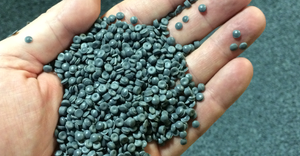Leading Companies from Across the Value Chain Take Action to Enhance Polypropylene Circularity with First Request for Proposals
July 9, 2020

FALLS CHURCH, Va. (July 8, 2020) – The Recycling Partnership is pleased to announce today the launch of its Polypropylene Recycling Coalition, an industry collaboration to improve polypropylene recovery and recycling in the United States and further develop the end-market of high-quality recycled polypropylene. The Coalition is also taking its first action by opening a Request For Proposals (RFP) for Material Recovery Facilities (MRFs) to apply for financial grants to enable improved sortation of polypropylene and widen acceptance through consumer education programs in communities.
The Polypropylene Recycling Coalition, as part of The Recycling Partnership’s Pathway to Circularity Initiative, is supported by funders representing all segments of the material’s value chain, including founding members Keurig Dr Pepper, Braskem, and the Walmart Foundation. Additional inaugural members include American Chemistry Council, Danone North America, EFS Plastics, KW Plastics, LyondellBasell, Procter & Gamble, St. Joseph Plastics, and Winpak. The Coalition set an initial funding target of $35 million over five years and is seeking additional supporters.
“Together, we can stimulate a systemwide shift to increase the capture of polypropylene and demand for recycled content. We encourage all companies that use polypropylene to be part of the solution,” said Keefe Harrison, CEO of The Recycling Partnership. “The Polypropylene Recycling Coalition’s work to improve and increase the recovery of polypropylene will support jobs, preserve natural resources, and help build a circular economy in the United States.”
This industry-wide collaborative will address key opportunities in recycling polypropylene, or No.5 plastic, which has properties that make it an invaluable material found in everyday consumer packaging such as yogurt cups, coffee pods, butter tubs, and many others. According to The Recycling Partnership’s 2020 State of Curbside Recycling report, there may be as much as 1.6 billion pounds of polypropylene available per year from single-family homes that could be recycled into new products ranging from automotive parts to personal care and food packaging.
The Polypropylene Recycling Coalition’s RFP will improve polypropylene recycling in the United States by awarding grant dollars to be applied to purchasing polypropylene sorting equipment and supporting consumer education programs in communities. Through funding like these grants, research, and consumer education programs, the Coalition aims to make it easier for people to recycle polypropylene in curbside recycling and ensure that more recyclers can effectively sort the material in their facilities.
The Polypropylene Recycling Coalition will be aided by an advisory committee of industry leaders including, Association of Plastic Recyclers, Closed Loop Partners, Sidewalk Infrastructure Partners, Sustainable Packaging Coalition, and World Wildlife Fund. Former EPA Administrator Carol Browner will serve as an independent advisor to the Coalition.
To learn more about the Polypropylene Recycling Coalition, its members, and how to get involved in supporting its goals, visit recyclingpartnership.org/polypropylene-coalition. For MRFs interested in applying for a grant, the application is available on The Recycling Partnership’s website.
About The Recycling Partnership
The Recycling Partnership (recyclingpartnership.org) is a national nonprofit organization that leverages corporate partner funding to transform recycling for good in states, cities, and communities nationwide. As the only organization in the country that engages the full recycling supply chain from the corporations that manufacture products and packaging to local governments charged with recycling to industry end markets, haulers, material recovery facilities, and converters; The Recycling Partnership positively impacts recycling at every step in the process. The Recycling Partnership has served more than 1,500 communities and counting with best-in-class tools, data, resources, and technical support, helped place more than 700,000 recycling carts, reached 74 million American households, and helped companies and communities invest more than $57 million in recycling infrastructure. In doing so, The Recycling Partnership has created meaningful social, environmental, and economic change. By the end of 2019, the nonprofit change agent estimates it diverted 230 million pounds of new recyclables from landfills, saved 465 million gallons of water, avoided more than 250,000 metric tons of greenhouse gases, and driven significant reductions in targeted contamination rates.
You May Also Like


